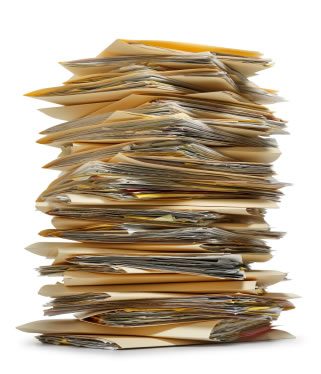The question of how long do you need to retain business records frequently comes up in discussions with business owners everywhere. Do you know how long you need to keep employee applications? How about general ledgers or bank statements? As a small business owner, it’s important to know these things (or at least have something to easily reference) when it comes to maintaining and storing business records properly.
According to IRS Regulation – 26 CFR 1.6001 (view/download pdf), businesses are required to keep records appropriate to their trade or business. The IRS has the right to view these records in the event of a tax return audit. In addition to the IRS’s ability to audit the books, most states have laws requiring the maintenance of business records as well. Many states also have auditors who may show up unannounced to review your company’s state tax records. In order to avoid penalties and fines, it is essential that you correctly maintain and store your records properly.
The list below has been compiled directly from the IRS’s recommendations in Section 6001.
PERMANENT RECORDS
- Audit reports from CPAs
- Canceled checks for important payments — i.e. taxes, purchases of property, special contracts, etc. (checks should be filed with the papers pertaining to the underlying transaction)
- Capital stock and bond records: ledger, transfer registers, stubs showing issues, record of interest coupons, options, etc.
- Cash books
- Chart of Accounts
- Correspondence (legal and important matters only)
- Deeds, mortgages, and bills of sales, as well as contracts and leases still in effect
- End of year financial statements (monthly statements are optional)
- General and private ledgers
- Insurance records, current accident reports, claims policies
- Journals
- Minute books of directors and stockholders, including by-laws and charter
- Property appraisals by outside appraisers
- Property records — including costs, depreciation reserves, and end-of-year trial balances, depreciation schedules, blueprints, and plans
- Tabulating records related to above areas
- Tax returns and worksheets, Revenue Agents’ Reports and other documents relating to determination of income tax liability
- Trademark registrations
SIX TO SEVEN YEARS
- Accident reports and claims (settled cases)
- Accounts payable (see Voucher Register)
- Accounts receivable ledgers and trial balances
- Canceled checks (see exception under Permanent Records)
- Canceled stock and bond certificates and expired options
- Contracts and leases (expired)
- Expense analyses and expense distribution schedules
- Inventories of products, materials and supplies
- Inventories to customers
- Invoices from vendors (see Vouchers)
- Notes receivable ledgers and trial balances
- Payroll records and summaries including payments to pensioners
- Employee personnel records after termination (if a retirement plan was in effect, regardless if employee was a plan participant); (if employee was a participant in a pension plan, consult your plan adviser)
- Retirement Plan returns and reports (from filing date of such returns and reports)
- Retirement Plan accounting records (to correspond with returns and reports)
- Purchase orders (purchasing department copy)
- Sales records
- Scrap and salvage records-inventories, sales, etc.
- Subsidiary ledgers to the general ledger and trial balances
- Time books
- Voucher register and trial balances
- Vouchers for payments to vendors, employees, etc. (including allowances and reimbursement of employees, officers, etc., for travel and entertainment expenses)
TWO TO THREE YEARS
- Applications for Employment
- Employee personnel records after termination (see exception under Six to Seven Years)
- General Correspondence
- Insurance policies that have expired
- Internal audit reports, including working papers (in some situations, longer retention periods may be desirable)
- Miscellaneous internal reports
- Petty cash vouchers
- Physical inventory tags
- Savings bond registration records of employees
ONE YEAR OR LESS
- Bank reconciliations (keep one year)
- Bank statements (keep one year)
- Correspondence of unimportant nature with customers or vendors
- Duplicate deposit slips
- Purchase orders (except purchasing department copy)
- Receiving sheets
- Requisitions
- Stenographers’ notebooks
- Stockroom withdrawal forms
We suggest that you review this list with your company’s accountant to ensure that it is also in compliance with your state’s record keeping requirements.

